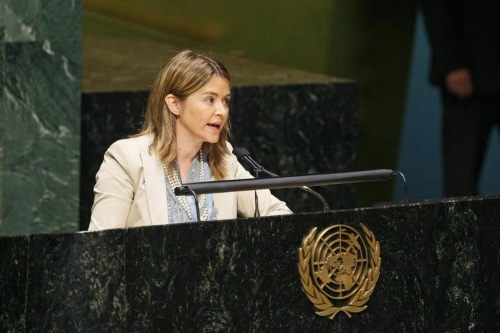
And, it does propel some important considerations of access to water as well as sanitation, health and productivity to the forefront. “Lack of sanitation implies the loss of millions of school and work days as well as enormous health costs:” Catarina de Albuquerque, UN Special Rapporteur on the Human Right to Safe Drinking Water and Sanitation, on World Toilet Day, (observed on 19 November each year). Developed countries are only able to improve life expectancy and reduce child mortality as governments began making substantial investments in sanitation.
$1 on Sanitation = $9 in Savings & Productivity:
“The sanitation sector is in desperate need of more financial resources, in both developing and developed countries, but investing in sanitation is good business and a smart deal,” noted Ms. de Albuquerque, (Photo Above), stressing that for every dollar spent on sanitation facilities, there is an average return of $9 in averted costs and productivity gains. Developed countries were only able to improve life expectancy and reduce child mortality when governments began making substantial investments in sanitation. Clean Water though does have its own UN Goodwill Ambassador(s) –Advocate(s): See Film Report – “Orlando Bloom, Diplomat-Artist” & Clean Water” -
diplomaticallyincorrect.org/films/movie/orlando-bloom-diplomatartist-clean-water/25588) & “SHAKIRA in Bangladesh” -
diplomaticallyincorrect.org/films/movie/shakira-in-bangladesh/25802).
The Multiplier Effect:
“Especially in a period of economic crisis, it is fundamental to invest in crucial sectors that have a multiplier effect, spend the available resources more efficiently and ensure better targeting so as to prioritize the most excluded and marginalized” - In her recent report to the General Assembly entitled ''Financing for the Realization of the Rights to Water and Sanitation,'' Ms. de Albuquerque underscored the need to increase and restructure financing in the water and sanitation to meet human rights requirements. The problem may be especially severe in areas recently affected by natural disaster and/or conflict. (Read “Bad News from Haiti & Dominican Republic” -
diplomaticallyincorrect.org/films/blog_post/bad-news-from-haiti-the-dominican-republic-by-susan-sacirbey/30344 . Also See Film Report – “Gaza Water” -
diplomaticallyincorrect.org/films/movie/gaza-water/25814).
More Money on Bottled Water than on Sanitation?
Universal access to sanitation by 2015 would require over $14.5 billion annually. “This seems a huge sum,” Ms. de Albuquerque pointed out. “Yet, put in perspective, it is less than what people in rich countries spend on bottled water each year.” (Another Creative look at Sanitation – “Don’t Crap on Mother Earth!” -
diplomaticallyincorrect.org/films/movie/dont-crap-on-mother-earth/26344).
Based upon last year's global annual assessment of sanitation and drinking by UN agencies, 95 per cent of countries reported that current funding was not enough to provide access to half of those without toilets. According to Ms. De Albuquerque: “Additional resources are needed for the realization of the right to sanitation, but a lot more could be achieved with the funds already allocated. Money is being spent in the wrong places. We need better targeting of resources aligned with human rights requirements.”
See Film Report – “Argentina River” -
diplomaticallyincorrect.org/films/movie/argentina-river/27194
diplomaticallyincorrect.org/films/movie/nigers-futuresweeping-away-infant-mortality/25183
By Ambassador Muhamed Sacirbey
Facebook – Become a Fan at “Diplomatically Incorrect”
Twitter – Follow us at DiplomaticallyX
More at “Ecology-Diplomat” Channel -
diplomaticallyincorrect.org/c/ecology-diplomat

